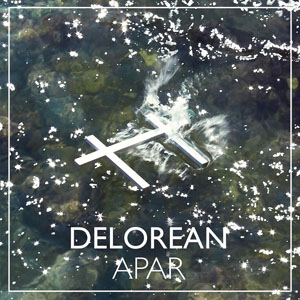Delorean Apar
A little less than three years ago, XLR8R deemed Delorean‘s Subiza LP to be our […]

A little less than three years ago, XLR8R deemed Delorean‘s Subiza LP to be our favorite release of 2010. Apar—the Spanish outfit’s first recorded material to surface since then—finds the quartet only carefully tweaking the Balearic-tinged, indie-friendly, dance-pop formula which yielded its standout album and certainly contains a number of breezy, fun, and ultimately worthwhile jams, but it lacks the consistency of its predecessor.
Apar is a noticeably less energetic album than Subiza. The club and rave influences which were integral to the previous record’s signature sound have been reigned in, percussive and rhythmic momentum no longer pushes at the forefront, and more straightforward—and, at times, predictable—arrangements are utilized. While still very much crafting sun-kissed, tropical-soaked dance-pop hybrids, Delorean sounds less concerned with fun in its new form. The exuberant elation which made songs like “Real Love” and “Stay Close” instantly infectious is not completely stripped away though, but rather fitted into a more even-keeled approach, which is perhaps the sign of a band whose musical outlook has matured over the past three years.
Delorean has referred to Apar as the group’s “big production album,” which it seems not only refers to the overall sound of the record—a mix of ’80s-pop sheen with an extra dose of dreamy textures—but also to a shift in songwriting, which also appears to take a fair share of cues from the grander end of classic ’80s pop. What results is a record that is not primed for dance parties but instead for more traditional listening environments. To this end, Delorean does give listeners a number of songs that are enjoyable from beginning to end simply for the sake of, well, listening. Early on, “Destitute Time” and “Dominion” arrive as two of Apar’s most hook-laden efforts; the former combines the long-winded vocals of Cameron Mesirow (a.k.a. label mate Glasser) with an upbeat, guitar-led track which takes occasional instrumental breaks full of big tom rolls and swirling synth FX, while the latter wraps the blissful plucks of an almost Arabic-sounding guitar (a texture that finds its way onto many of the songs here) around a samba-like beat and includes Apar‘s most soaring chorus. Later on, “Walk High” is similarly successful, incorporating the vocals of Chairlift‘s Caroline Polachek into a Qunicy Jones-indebted slice of funky, yet introspective, dance pop. Interestingly enough, it is the album’s closing cut that may sound the most familiar to Subiza fanatics, with “Still You” presented as a slice of heavenly disco, one which graciously indulges in sparkling synth motifs and melodies rendered from repitched vocal “oohs.”
Along the spectrum of electronic pop, Delorean moves more towards pop with Apar, and as a result, those who found themselves helplessly sucked into the group’s brand of youthful, breezy tunes due to their reformatted club components may feel something is missing here. Still, the group’s warm allure and knack for melody have not been lost. Perhaps because they sound so closely related to the songs of Subiza, one can’t help but imagine songs like “Spirit,” “Destitute Time,” or the particularly sentimental “Your Face” infused with a bit more rush, exuberance, and dancefloor nods. If Subiza had faded from our memories, maybe we would not comprehend these songs as lacking in some way, but that is likely the price of making an album that is so sticky—those songs will rattle around in our heads for a long time. Until then, Apar is left to sound good but not great, worthwhile but not essential, Delorean but not quite.

